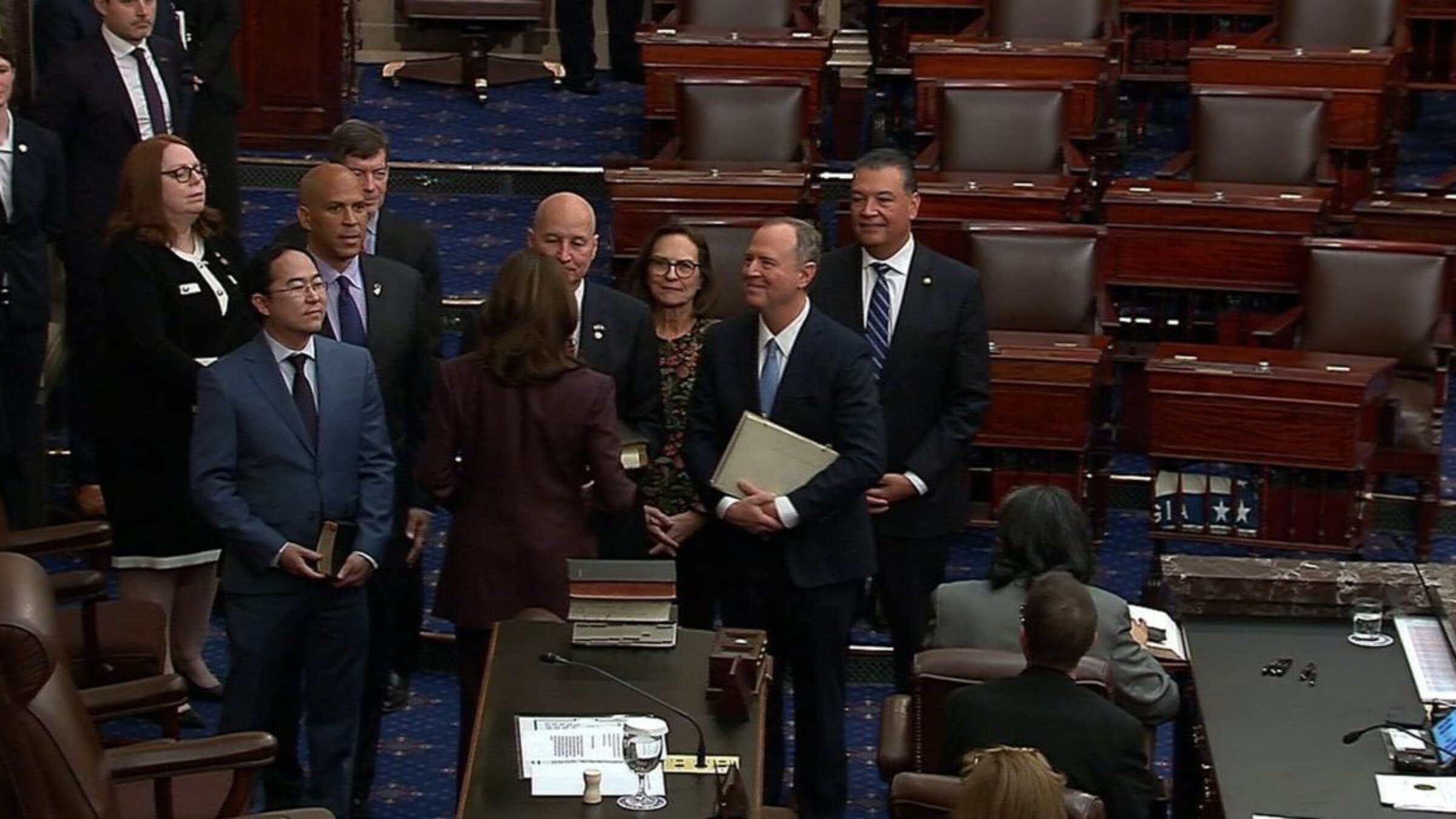Adam Schiff chose Mishneh Torah for swearing in to the US Senate
Schiff, whose father died earlier this year, said he was saddened his dad couldn’t witness the Senate ceremony

Senator Adam Schiff is sworn in to the U.S. Senate holding a Maimonides Mishneh Torah. Photo by C-SPAN
Adam Schiff, the Jewish Democrat who came to national prominence as the lead prosecutor in Donald Trump’s first impeachment, was sworn in as a U.S. senator on Monday after his election in November. He succeeded Laphonza Butler, who was appointed to the Senate following the death of longtime Sen. Dianne Feinstein last year.
Schiff, 64, took the oath of office holding a Maimonides Mishneh Torah (Second Torah) printed in Italy in 1490. The selection of this text – a 14-volume code of Jewish law and practice written by Moses Maimonides, also known as the Rambam – sparked debate over its halachic permissibility for swearing an oath, as it is not the official Hebrew Bible.
Why Schiff chose the Mishneh Torah
Schiff, in a statement ahead of his swearing in on Monday, said the edition, published in the duchy of Milan, now in northern Italy, was “a monumental legal code and one of the most organized, comprehensive, and influential works of Jewish law.”
A spokesperson for Schiff, until this week a U.S. Representative and a former federal prosecutor, said he chose the volume, held by the Library of Congress, in part because of his concerns about the state of the rule of law as President-elect Donald Trump returns to office.
The spokesperson said that Schiff was also attracted to the volume because of his intellectual curiosity. “It’s simply his nerdy interest in how old this volume is and how comprehensive it is,” she said.
Schiff was sworn in along with several other senators, including Andy Kim, a Democrat from New Jersey and the first Korean American senator in history. Kim succeeded George Helmy, a former chief of staff to Gov. Phil Murphy, who filled Sen. Bob Menendez’s seat until the general election after Menendez was convicted of bribery charges. In a Senate floor speech before the ceremony, Senate Majority Leader Chuck Schumer said Schiff brings “an impressive record as a leading voice among House Democrats, where he was known for his piercing eloquence, his thoughtfulness, his unwavering support of democracy and his courage.”
Schiff’s Jewish background and heritage

Born in Framingham, Massachusetts, and raised in Arizona and California, the Schiff family belonged to Temple Sinai, a Reform congregation in the Southern California city of Glendale. However, in a recent interview, Schiff said as an adult he doesn’t belong to a synagogue, but that Jewish ethics guide him, and he celebrates Jewish holidays.
On Election Day, Schiff carried his grandfather’s watch as a symbol of that heritage. He said that his deepest regret is that his father, who passed away earlier this year at age 96, did not live to see him sworn into the Senate. “He loved to say, ‘From the shtetl to Congress in three generations — only in America,’” Schiff recalled.
Schiff is one of six Democrats, including two Jewish members of Congress, elected to the Senate in the November elections. Schiff was sworn in to complete Butler’s interim term. His six-year term officially begins in January, when he will be sworn in again.
Schiff said he would carry on the legacy of Feinstein and former Sen. Barbara Boxer, who retired in 2017, both of whom shared his Jewish heritage and liberal values. “My father would talk often about his father and grandfather and standing on the shoulders of those who went before,” Schiff said. “I think that ethic is very much the same as with Sens. Boxer and Feinstein.”
JTA contributed to this report.
















